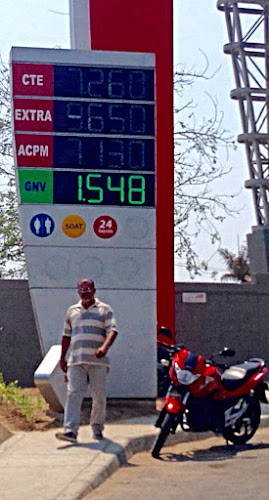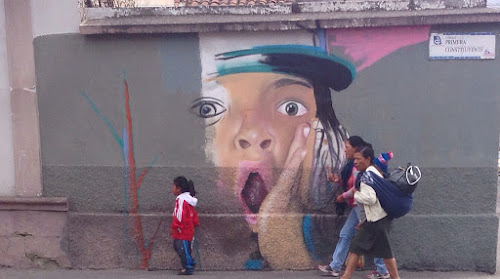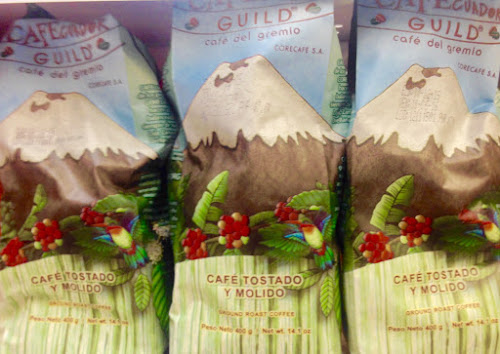In Argentina it's gas and asado, full catering with café con leche, air conditioning and stuffed sofas. In Uruguay it's gas and free maté water with the key to the trucker's shower. In Bolivia it's gas: only sometimes, and then foreigners are charged double. In Chile it's gas and all polished marble, with Europa pricing. In Perú it's gas that's sold by the US gallon and stations that come in multiples of five. In Ecuador it's gas, and my conviction that they add soot to the distillate at the refinery. Here in Colombia it's gas and a story.
We've cleared the formalities at the border, our next priority is some local currency and the Forager is looking for a suitable dispensary. I should be assisting, only my attention is drawn to the queue snaking out from the first gas station. The fact that there is a fuel dispensing point right at the frontier is the first indicator, the second is the preponderance of registration plates from the country that we've just left. The disparity in price between countries can be remarkable.
My defence for being sidetracked is admissible, it's my priorities that are questionable. So by way of mitigation, at some point I will need to fill the fuel bottle, asking the pump attendant to "fill it up", is a simple recipe for overfilling. So it's best to ask for a given monetary amount. Hence the need to know the cost, which is sometimes displayed. What isn't is the price relative to volume. Get it wrong and the difference between gallons and litres is a flash-back of petrol over my hand and an oily slick seeping up my leg. Acronyms, terms, and confusions; there in lies my Colombian conundrum. I now know that it's pesos per gallon, I can understand diesel and super, even 'gnv', but what exactly is 'corrientes', 'acpm', or 'cte'?
Gas StationAmericas. Within country they have a general sameness, it's between country that the differences are most pronounced. For the wandering cyclist the best can offer sustenance: fuel for the stove, fuel for the soul. A punctuation on a long open road, a beacon on a otherwise deserted junction. One that offers relief from a blazing glare, a cold soda-pop and some slow wi-fi. In Colombia they come with one additional welcoming feature, one that was once a standard in many other countries: the 'road-house hotel'. Simple, clean, basic rooms. Cold showers and fresh towels, a bar of soap and the ubiquitous television. For us, the latter is both redundant and vital, for the TV will always have a working electrical socket in its general vicinity. A place to power up the hungry electronics, a point for the 'one cup boiler' to brew coffee and heat a warm bucket-bath.
 |
| Tile covered concrete everything |
We've paid the room rate, collected a key and the mandatory 'tele'gizmo', pushed our bikes around the corner to a ground floor door. We've inspected the layout and decided; that, if we push the bed to one side the bikes can come right inside. It's our preferred 'perfect senario'. Expecting a light slatted frame, I eagerly push. Nothing happens, try again: same result. Slow learner. So I lift the enveloping bed spread to discover that the bed-base is constructed from the same materials as the floor and the walls. They're all one and the same. Red industrial brick, with a glossed coating of varnish. Simple, low maintenance cleaning, with no place for the dust bunnies to hide. On a subsequent night we will encounter the poured-'crete variant, that not only included all of the above, but also the bed-side tables, the ceiling and the seating. Nothing could move, with the unfortunate exception of the untethered wash basin.
Back at the pump. I've done my due diligence, sourced an answer and calculated my request. The acronym transpires to be the lowest grade of petrol: it will, with gentle encouragement, power the stove. Banging, crashing and swearing I've found to work best. The 'corrientes' has proven more problematic, as I keep seeing it in restaurants, where it's the set menu of the day, on the forecourt it's 'normal', somewhere around 'octane90'.
I'm holding the bottle, the attendant pulls the trigger. He's careful, they're well used to filling plastic juice bottles for the abandoned moto farther down the road. Still it overflows. Somewhere between conversion and gallon, peso and devision, I had multiplied a miscalculation.
So be it, I've got fuel for our stove. Not that we will need it. For that's another welcome addition to the 'road house'. They're the trucker's night stop, they have vast parking lots and restaurants that serve 'gasolina por ciclistas'.































